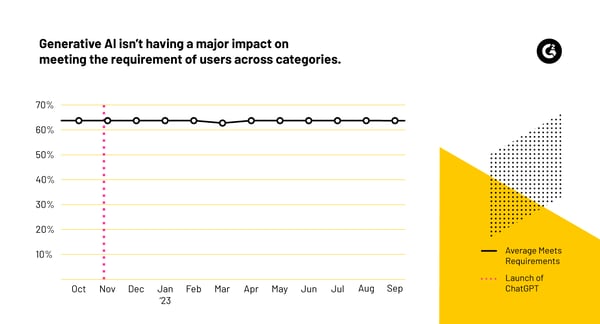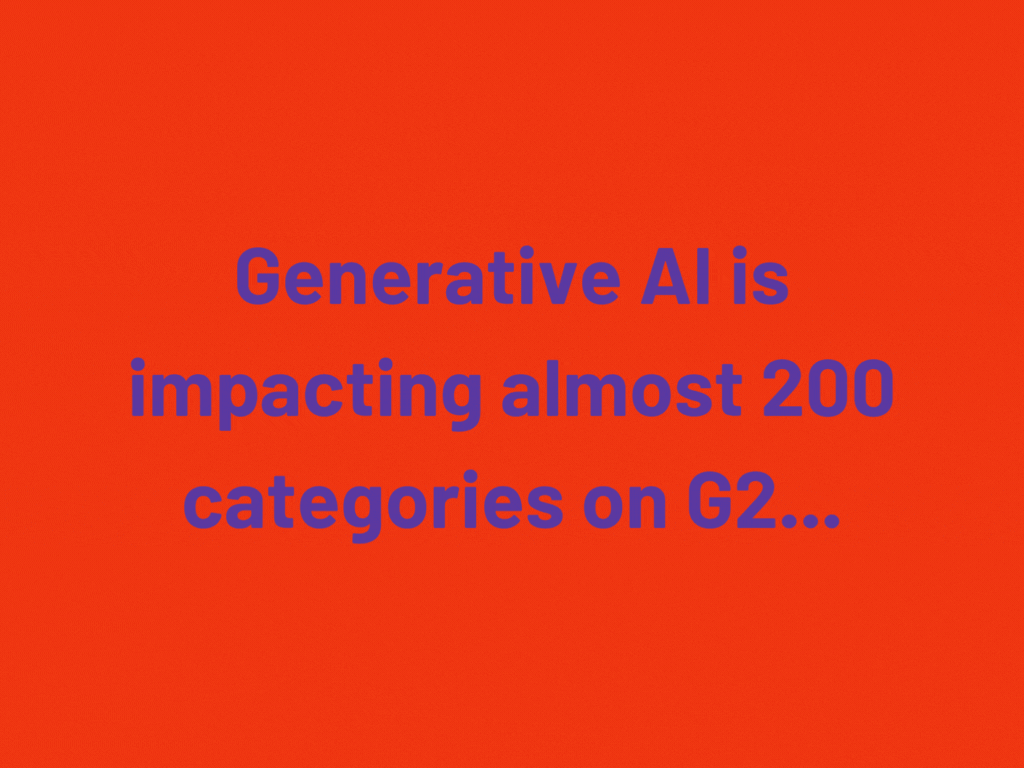This post is part of G2's 2024 technology trends series. Read more about G2’s perspective on digital transformation trends in an introduction from Chris Voce, VP, market research, and additional coverage on trends identified by G2’s analysts.
Generative AI is hot, but it will cool down
Prediction
In 2024, some software vendors will realize that the AI they are incorporating into their solutions isn’t making a tremendous difference – and we will see the less-than-useful AI disappear and the helpful AI stay.
AI has been in the news a lot recently. And at G2, we have seen that AI is infusing software across hundreds of categories across our taxonomy. However, we also see that business software users are still not meeting all of their requirements despite this AI injection.
According to G2’s 2023 Software Buyer Behavior Report, the necessity to realize an ROI within six months is the most important consideration during the purchase process of respondents who anticipate software spending to increase in 2024. In other words, software buyers want software that will meet their requirements and make them money.
Unless you’ve been living under a rock, you’ve seen the headlines:
- “AI is here to stay”
- “The robots are taking our jobs”
- “Meet your boss: AI”
These made-up yet representative headlines speak to a trend occurring over the past number of years, which has been ramping up over the past year since the launch of ChatGPT toward the end of 2022.
Generative AI is on the rise and is being incorporated into the workflows of business users and the products of software vendors.
Indeed, G2 has found (generative) AI features across around 200 categories, from Product Data Management (PDM) to Human Resource Management Systems and Human Capital Management (HCM) Software.
Across these categories, many software vendors have incorporated the following features:
|
Feature
|
Feature description
|
|
Text generation
|
Allows users to generate text based on a text prompt.
|
|
Text summarization
|
Condenses long documents or text into a brief summary.
|
|
Text-to-image
|
Provides the ability to generate images from a text prompt.
|
|
Text-to-speech
|
Simulates human-like speech from text inputs.
|
|
Image-to-text
|
Converts images into a textual description, identifying key elements.
|
|
Text-to-video
|
Provides the ability to generate video from a text prompt.
|
|
Text-to-3D
|
Provides the ability to generate 3D renderings from a text prompt.
|
|
Text-to-music
|
Produces music based on provided style or parameters.
|
With a potential impact on almost 28,000 products, one might think that the impact would be huge and that the users’ superpowers would allow them to reach new heights.
However, software users are not having magical outcomes with AI
Even with this injection of AI, users are not magically transformed. They are not (yet) achieving new heights and meeting their desired requirements any more now than they were a year ago.
As we can see in the chart below, the average Meets Requirements scores across categories that have generative AI features have remained very consistent.
G2 data has also found that average ROI has not seen great change either. Although the average time to achieve a positive ROI went down from 16 to 14 months in December 2022, it has hovered at around 15 months since then.

Where are these generative AI features, and where will they go?
If we zoom out, we note that a large (and growing) number of categories are incorporating generative AI features.

That is dandy and helpful, right? Maybe.
Software vendors have been quick to add these features, but we don’t think they all will stick. If it is costing the vendors money to add this tech and if it isn’t making a material impact on the users’ work, a scaling back is inevitable.
Therefore, vendors won’t keep gimmicky features around in the long run if it doesn’t provide a meaningful impact on businesses. A number of these categories are expected to drop AI features.
We expect businesses to find solutions that can help them with their business problems and not just run after shiny AI tools.
Learn everything you wanted to know and more about generative AI.
Edited by Jigmee Bhutia


 by Matthew Miller
by Matthew Miller
 by Matthew Miller
by Matthew Miller
 by Matthew Miller
by Matthew Miller